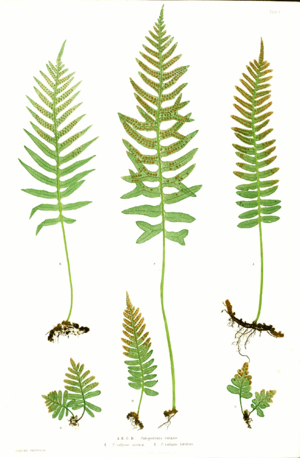The Ferns of Great Britain and Ireland facts for kids
The Ferns of Great Britain and Ireland was a special book published in 1855. It contained 51 amazing pictures of ferns. These pictures were made using a cool new method called nature printing, created by Henry Bradbury.
Contents
About the Book
This book was a scientific guide to all the different types of Ferns found in the British Isles. A botanist named Thomas Moore wrote the text. John Lindley was the editor who helped put the book together.
The "Fern Craze"
The book came out during a time when people in Britain were obsessed with ferns. This period was even called "pteridomania" or the "fern craze." Many people collected ferns and grew them in their homes and gardens.
Nature Printing Explained
The Ferns of Great Britain and Ireland used a new printing method. This method was called nature printing. Henry Bradbury developed this special technique. He got the idea after seeing something similar by Alois Auer.
Nature printing was a very innovative way to make pictures. It allowed for incredibly detailed images of plants. The publisher of the book was Bradbury and Evans.
How Nature Printing Worked
The process involved pressing real plants onto soft lead plates. This would leave a perfect impression of the plant. Then, these lead plates were treated with electricity. This turned them into metal printing plates.
The tiny details of the fern leaves and stems were then colored by hand. This made the final pictures look very realistic. The images usually had two colors. They showed every detail of the fern species.
Why Ferns Were Perfect
Nature printing was a clever idea, but it didn't last long. Only certain plants could be printed well this way. Plants needed to be mostly flat to work. Ferns were perfect because their fronds (leaves) are quite flat. This made them ideal for capturing all their fine details.
See also
 In Spanish: The Ferns of Great Britain and Ireland para niños
In Spanish: The Ferns of Great Britain and Ireland para niños
 | Kyle Baker |
 | Joseph Yoakum |
 | Laura Wheeler Waring |
 | Henry Ossawa Tanner |


